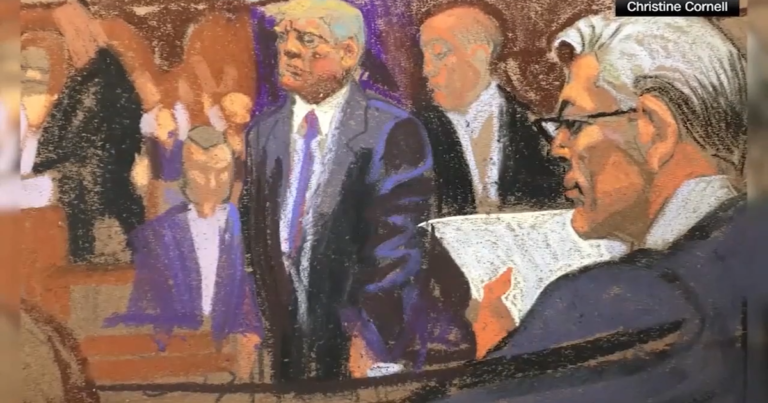HELENA, Montana – In national news this week, the conviction of former President Trump on Thursday has upended the political landscape.
Political analyst Mike Denison explains how this could affect Tuesday’s primary election in Montana.
Denison also takes a closer look at the local elections and initiatives on the June 4 ballot and explains how voter turnout could affect the outcome.
Bradley Warren: Mike, I want to talk to you about the ruling. I want to talk to you about absentee voting and voter registration. I guess you have some numbers you want to talk about, but I’m curious to know if the ruling against Donald Trump is going to have an impact on turnout in the primary on the 4th.
Mike Denison: It’s possible… I don’t think so, because the primary, like most elections, isn’t about picking who’s going to win or lose — it’s about picking the candidates.
There may be a slight increase in voter turnout, but I’m not sure what that means for any particular election.
I think what we want to look at in terms of how that will impact things is that it’s going to happen more in the general election than it will in the primary.
BRADLEY WARREN: I’ve been talking to Democrats and Republicans on this show all morning, and the Democrats say they’re working to solve the problem, and the Republicans say they’re going to take the cash because it’s an incentive. In the last 24 hours, from the time the verdict was handed down until the next morning, $34.8 million was raised for the former president. Are you surprised?
Mike Denison: No. In fact, when I was reading about the verdict yesterday, I thought the good thing about this, maybe the only good thing about it for Donald Trump, is that he’s going to raise a lot of money out of this, because a lot of his supporters are going to be mad and they’re going to give him some money.
But when it comes to who decides what in this fall’s elections, having a convicted felon at the top of the list of candidates is hardly a good thing.
And the enthusiastic Trump supporters, the enthusiastic Republicans, will certainly support Trump, but in close races in, say, Montana and other battleground states, the real question is how does that affect independents and non-enthusiastic voters?
And most polls suggest that convicting or finding Trump guilty would not help that demographic of voters — and in a close race, that could affect the outcome.
Bradley Warren: Yeah, 100% purple voter, Mike, and I’m watching that too, because I think another thing that’s interesting here is what happens not just in this primary but in the general election.
Because only a small percentage of these undecided voters can determine who occupies the White House.
So, I want to talk more at the state level, about the legislative primaries. There are 42 districts. Is that correct? There are 42 Republican districts…
Mike Denison: 42 Republican elections. That’s right, a third of the legislative primaries. That’s right.
And that’s what I’m primarily looking at in these primaries. There are Democratic primaries, but they’re few and far between. But in the Republican primaries, at least half of them, maybe more, are pitted against the more conservative faction of the party against the maybe less conservative faction.
And what that actually means is that people who are in more conservative groups tend to be more skeptical of government and government spending, except maybe when it comes to restrictions on abortion and voting rights and things like that, but still, there’s a fight between those two groups and there’s actual money being spent by candidates and outside groups, and so those issues don’t get a lot of coverage, so it’s hard for voters to gauge what’s going on.
But I would encourage them to think carefully about who these candidates are and what they’re saying before they vote. And these are very important primaries, because the winner of the Republican primary is really going to determine the character of Congress next year.
Bradley Warren: Yeah, I was just talking to Nancy Keenan about basically the same topic, which is, she said, Republicans have the supermajority, they have the governor’s mansion, and she thinks that if Democrats run on issues like high taxes, some of those seats could go her party’s way.
So I was interested in that conversation about the strategy that she thinks Democrats need to implement there, and so the next strategy, given all of this, is a serious effort to advance many of these initiatives, as we’ve seen over the last six to eight months, because many people believe some of these initiatives will increase support at the polls.
This is your first look at the upcoming initiatives. What is the status of the signatures and funding for promoting these initiatives?
Mike Denison: Basically, we’re talking about two initiatives. CI-128 is an abortion rights amendment to the Constitution. And CI-126 and CI-127 are election reform initiatives that would create open primaries, which is a little bit more complicated.
But the two groups that support these efforts have spent more than $3 million so far on the abortion rights effort and $4 million on the election reform effort, and neither has spent any of the money they’ve raised. But they’ve spent a lot of money on signature gathering, and they’ll be out in droves at polling places in the primary to collect signatures. And we won’t know what’s going to happen on this until maybe late June or early July.
But I think if these issues, especially abortion, are done well, they could help Democrats in terms of turnout and votes.
We know that even if people support abortion rights, that doesn’t necessarily translate into them voting Democrat, but it would certainly increase voter turnout.
Bradley Warren: We’re heading into Round 4, the closing of the primaries, and I think things will become clearer. What are your predictions and final thoughts going into Round 4?
Mike Denison: Well, I think the one to watch is the Republican primaries, especially in the eastern congressional districts, the legislative primaries and some other seats, there’s all the action there.
I think that’s what we’ll be talking about this Tuesday.


